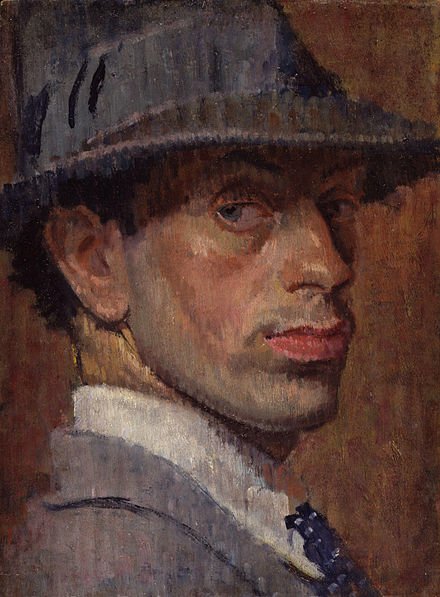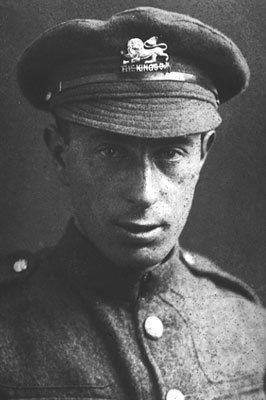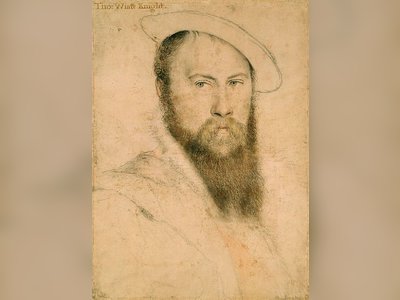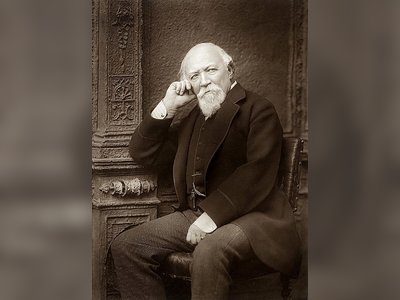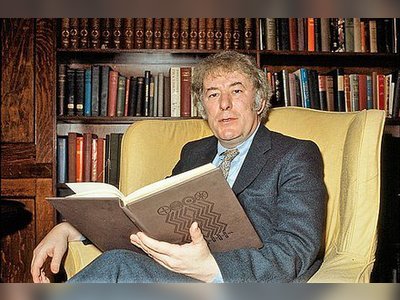British Heritage
Remember, Cherish, Learn.
beta
Isaac Rosenberg - Poems from the Trenches, WWI
A Poet of the Trenches and an Enduring Legacy of British Heritage.
Isaac Rosenberg, a notable English poet and artist, has left an indelible imprint on the fabric of British heritage. His impactful body of work, particularly his "Poems from the Trenches" penned during the horrors of World War I, serve as poignant testaments to the human spirit amidst the calamity of war. As an individual, Rosenberg was unique in his perspectives and contributions; as an artist, his legacy is an integral part of British history.
Isaac Rosenberg was born on November 25, 1890, in Bristol. He was the second of six children and the eldest surviving son - his twin brother tragically passed away at birth. His parents, Barnett and Hacha Rosenberg, were Lithuanian Jewish immigrants who relocated to Britain from Dvinsk, now in modern-day Latvia.
In 1897, the family moved to Stepney, a less affluent district of East London with a significant Jewish community. Rosenberg's early education was marked by his attendance at St. Paul's Primary School, followed by the Baker Street Board School, where the Jewish presence was particularly prominent. His good conduct earned him the opportunity to take classes at the Arts and Crafts School in Stepney Green.
Rosenberg developed a fascination for both poetry and visual art, and began attending evening classes at Birkbeck College. In January 1911, he abandoned his apprenticeship with an engraver to pursue his passion for art at the Slade School of Fine Art at University College, London. There, he studied alongside a plethora of notable artists, including David Bomberg, Mark Gertler, Stanley Spencer, Paul Nash, Edward Wadsworth, Dora Carrington, William Roberts, and Christopher Nevinson. Despite his deteriorating health due to chronic bronchitis, Rosenberg managed to exhibit paintings at the Whitechapel Gallery and publish a pamphlet of ten poems, Night and Day, in 1912.
In pursuit of a cure for his chronic bronchitis, Rosenberg relocated to South Africa in 1914, aided by the Jewish Educational Aid Society of London. Here, in Cape Town, he penned the poignant poem, "On Receiving News of the War," wherein he expressed his inherent criticism of the concept of war.
Returning to Britain in March 1915, Rosenberg published his second collection of poems, titled "Youth," before enlisting in the British Army in October 1915. Despite his negative perspective of war, Rosenberg felt the need to contribute to the war effort, stating in a letter, "I never joined the army for patriotic reasons. Nothing can justify war. I suppose we must all fight to get the trouble over."
Rosenberg continued to write poetry while serving on the Western Front in France with the King's Own Royal Lancaster Regiment. Some of his most poignant war poems include "Break of Day in the Trenches," "Returning We Hear the Larks," and "Dead Man's Dump."
In January 1917, his family and friends successfully campaigned to have him removed from the front lines due to his ill health. Despite these difficult circumstances, Rosenberg's poetic output remained undiminished, and he composed the moving piece, "Dead Man's Dump," during this period.
Rosenberg's life tragically ended on April 1, 1918, when he was killed in action in Fampoux, a town north-east of Arras. His death was met with ambiguity as there was a dispute whether it was due to a sniper attack or close combat. Initially buried in a mass grave, his remains were later moved to Bailleul Road East Cemetery, Saint-Laurent-Blangy, Pas de Calais, France, in 1926. His gravestone bears the inscription - "Artist and Poet."
Isaac Rosenberg's poetic and artistic legacy has had an enduring impact on British heritage. His poems from the trenches, in particular, paint a vivid and honest picture of the horrors of World War I, providing a stark counterpoint to the common narrative of war as a patriotic sacrifice. Through his works, Rosenberg gave voice to the ordinary soldiers in the trenches, thus providing valuable insight into the human experience of war.
Rosenberg's life and work serve as a testament to the power of the human spirit, even in the face of the most brutal circumstances. His uncompromising commitment to his art and his unflinching depiction of the reality of war have left a profound impact on the cultural heritage of Britain. His contribution is a poignant reminder that even in times of immense hardship and conflict, the human spirit persists, and creativity continues to thrive.
A Formative Early Life
Isaac Rosenberg was born on November 25, 1890, in Bristol. He was the second of six children and the eldest surviving son - his twin brother tragically passed away at birth. His parents, Barnett and Hacha Rosenberg, were Lithuanian Jewish immigrants who relocated to Britain from Dvinsk, now in modern-day Latvia.
In 1897, the family moved to Stepney, a less affluent district of East London with a significant Jewish community. Rosenberg's early education was marked by his attendance at St. Paul's Primary School, followed by the Baker Street Board School, where the Jewish presence was particularly prominent. His good conduct earned him the opportunity to take classes at the Arts and Crafts School in Stepney Green.
Rosenberg developed a fascination for both poetry and visual art, and began attending evening classes at Birkbeck College. In January 1911, he abandoned his apprenticeship with an engraver to pursue his passion for art at the Slade School of Fine Art at University College, London. There, he studied alongside a plethora of notable artists, including David Bomberg, Mark Gertler, Stanley Spencer, Paul Nash, Edward Wadsworth, Dora Carrington, William Roberts, and Christopher Nevinson. Despite his deteriorating health due to chronic bronchitis, Rosenberg managed to exhibit paintings at the Whitechapel Gallery and publish a pamphlet of ten poems, Night and Day, in 1912.
War Years and Literary Contributions
In pursuit of a cure for his chronic bronchitis, Rosenberg relocated to South Africa in 1914, aided by the Jewish Educational Aid Society of London. Here, in Cape Town, he penned the poignant poem, "On Receiving News of the War," wherein he expressed his inherent criticism of the concept of war.
Returning to Britain in March 1915, Rosenberg published his second collection of poems, titled "Youth," before enlisting in the British Army in October 1915. Despite his negative perspective of war, Rosenberg felt the need to contribute to the war effort, stating in a letter, "I never joined the army for patriotic reasons. Nothing can justify war. I suppose we must all fight to get the trouble over."
Rosenberg continued to write poetry while serving on the Western Front in France with the King's Own Royal Lancaster Regiment. Some of his most poignant war poems include "Break of Day in the Trenches," "Returning We Hear the Larks," and "Dead Man's Dump."
In January 1917, his family and friends successfully campaigned to have him removed from the front lines due to his ill health. Despite these difficult circumstances, Rosenberg's poetic output remained undiminished, and he composed the moving piece, "Dead Man's Dump," during this period.
A Legacy Remembered
Rosenberg's life tragically ended on April 1, 1918, when he was killed in action in Fampoux, a town north-east of Arras. His death was met with ambiguity as there was a dispute whether it was due to a sniper attack or close combat. Initially buried in a mass grave, his remains were later moved to Bailleul Road East Cemetery, Saint-Laurent-Blangy, Pas de Calais, France, in 1926. His gravestone bears the inscription - "Artist and Poet."
Isaac Rosenberg's poetic and artistic legacy has had an enduring impact on British heritage. His poems from the trenches, in particular, paint a vivid and honest picture of the horrors of World War I, providing a stark counterpoint to the common narrative of war as a patriotic sacrifice. Through his works, Rosenberg gave voice to the ordinary soldiers in the trenches, thus providing valuable insight into the human experience of war.
Rosenberg's life and work serve as a testament to the power of the human spirit, even in the face of the most brutal circumstances. His uncompromising commitment to his art and his unflinching depiction of the reality of war have left a profound impact on the cultural heritage of Britain. His contribution is a poignant reminder that even in times of immense hardship and conflict, the human spirit persists, and creativity continues to thrive.
- Isaac Rosenbergen.wikipedia.org
